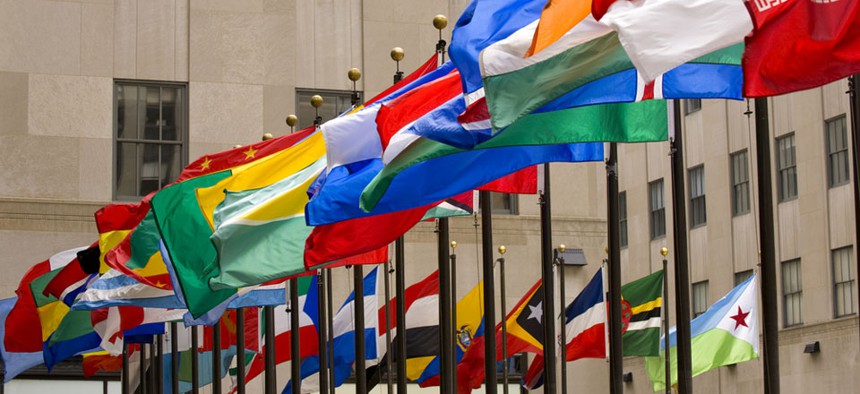How New US Net Neutrality Rules Are Shaping the Internet Worldwide

peterfactors/Shutterstock.com
Supporters see FCC's decision as the first open-Internet domino, but critics are warning of darker possibilities.
Fuel for the next wave of open Internet activists, or a propaganda tool for dictators?
New U.S. net neutrality rules are affecting Internet governance worldwide, reshaping the debate over Internet regulations as some major world powers near fork-in-the-road decisions about how they'll govern their own stretch of cyberspace. But while there's consensus that the U.S. decision will have impacts on Internet freedom worldwide, there's sharp disagreement over whether the new rules will help or hurt.
In general, one's take on the rules' overseas effects correlates closely one's view of the rules themselves, with supporters touting their benefits and critics warning of dire consequences.
Proponents of the rules are pointing to Europe, where the U.S. decision landed in the middle of the European Union Parliament's own debate over net neutrality. The most recent proposals in front of the governing body would be a break with the FCC's new rules, as they would allow Internet service providers to prioritize certain types of Internet traffic, the Financial Times reported this week.
The EU is expected to reach a decision this year, but some observers say the U.S. decision could change the debate's trajectory by rejuvenating European supporters of stricter net-neutrality standards.
"Civil society and grassroots movements, which in Europe are less professional—they're in a different stage, they're not as well-funded—I think they see that the narrative in the U.S. is that startups and civil society did it," said Jan Gerlach, a fellow at the Research Institute for Information Law at Switzerland's University of St. Gallen. "In Europe, that gives … the sense that they can do it."
How the European debate gets settled matters for more than just European companies and consumers: U.S. tech companies have a stake in it as well. If the rules allow ISPs to charge more for better service, Google and Facebook would face the same scenario they were trying to avoid by pushing for net neutrality in the U.S. Strict European rules that mirror the FCC's would keep the European market most open for American tech, Gerlach says.
According to the European Transparency Register—a database of lobby spending to which companies volunteer information—Microsoft spent more than 4 million Euros lobbying in Brussels for a yearlong period between 2013 and 2014. Google reported that it spent more than 1 million Euros to lobby the EU in 2013. But since the register does not require companies to report their spending, these numbers could in fact be much higher.
Giving Aid and Comfort to Censors?
But while proponents of the U.S. rules like to focus on the possibility that Europe will follow suit, critics of the policies are warning that the rules have set a different, darker precedent—one that will give authoritarian regimes cover to censor content and block Internet access among their citizens.
Republican FCC Commissioner Ajit Pai, who voted against the net neutrality rules last week, said last month that if the U.S. government tried to regulate the Internet, "it becomes a lot more difficult for us to go on the international stage and tell governments: 'Look, we want you to keep your hands off the Internet.' "
And Senate Commerce Committee Chairman John Thune warned at a committee hearing last week that authoritarian states such as China and Russia might try to exert influence over the Internet by subjecting it to regulations under a United Nations body. By enacting the FCC's net neutrality plan, Thune said, the U.S. weakened its argument for keeping the Internet outside of the U.N.'s regulatory jurisdiction.
Of course, autocrats' efforts to block and censor the Internet have been underway for decades, and proponents of the new policies say they give the U.S. a stronger platform to push for Internet freedom rather than undermine its position.
Larry Strickling, the Commerce Department's assistant secretary for communications and information, said at the hearing that there's no contradiction. "I fundamentally don't think this will change matters going forward," Stickling said. "The United States is opposed to intergovernmental resolution to these Internet issues. We will remain opposed to that."
FCC Chairman Tom Wheeler echoed Stickling's comments Tuesday at a gathering of tech and telecom leaders in Barcelona. "We remain absolutely steadfast opposed to intergovernmental structures that seek to impose their will on how the Internet operates," Wheeler said.
The worry that the FCC's net-neutrality rules are the first step toward Internet censorship comes from a misinterpretation of what's being regulated, according to the rules' supporters: The FCC is restricting how companies treat Internet traffic, but it's not deciding what content users can create or access.
"What we need to understand here is that the U.S. has not regulated the Internet," Gerlach said. "It has regulated access to the Internet, the last-mile connection."
(Image via peterfactors / Shutterstock.com)






